As we move towards the end of the season, teams are battling it out to clinch survival and European football for next season. Many clubs have ambitions of reaching a European competition, with this being the sole objective for many of the clubs in the Premier League. With England’s top-flight these spots are usually held by the ‘Big Six’ of Liverpool, Chelsea, Manchester United, Manchester City, Tottenham and Arsenal. These clubs frequently participate in European competitions with many of them reaching the later rounds in their respective competitions.
Aside from these powerhouses of English football, this article will explore whether European football has a positive influence on a Premier League team to become a successful team and consistent top-flight team. Using data analysis we will look at the current qualification for European competition in English football, the history of teams outside the ‘Big Six’ within the competitions and the financial side of the tournaments while touching upon recruitment, squad depth and the future of the Premier League.
Qualification in English Football
In England, there are a maximum of seven qualification places allocated for English teams. There are multiple circumstances in which the method to ‘get into Europe’ can change depending on the results of the season of qualification. To simplify, we will just focus on qualification into the 2022-23 European competitions.
With Liverpool winning the EFL Cup this season and with the FA Cup final being a battle between Chelsea and Liverpool, all the European places will be given to teams based on the final Premier League standings. Therefore, the top four teams will qualify for the UEFA Champions League. 5th and 6th will qualify for the Europa League because the FA Cup winner will finish within the top five giving the spot to 6th place. 7th place will get into the play-off round of the Europa Conference League because the EFL Cup winners (Liverpool) will be finishing in the top four which moves the Europa Conference spot to the next highest-ranked position in the Premier League.
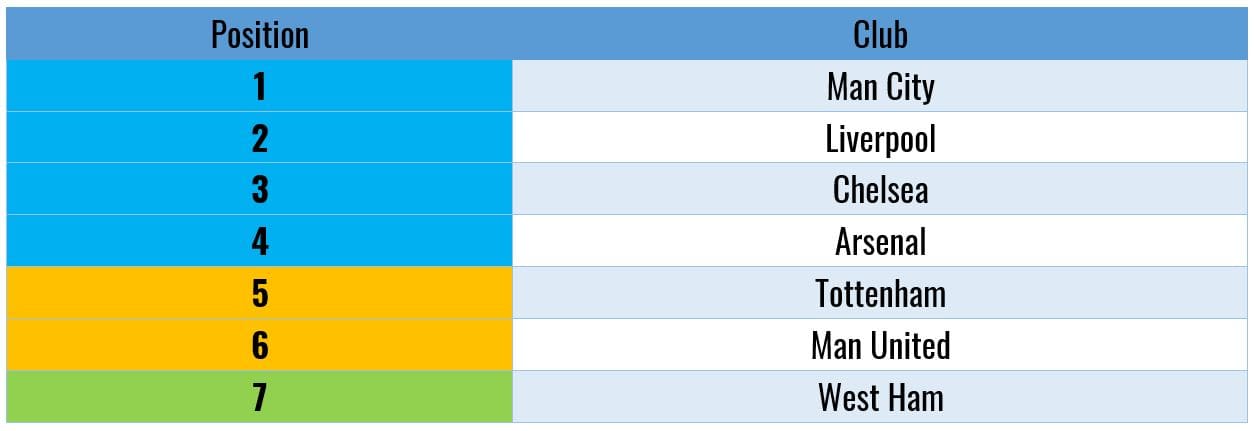
Going the distance
European football has been a competition that only a handful of teams have ever reached in England, with it being a huge achievement for any domestic team. However, with it being a competition between the best teams in Europe, it is always going to be difficult to go far in the competition and to reach the later rounds. To find out just how hard it is, we have taken all the teams outside the ‘Big Six’ who have entered the Europa League, with this being the only competition outside ’Big Six’ teams have achieved in Europe (excluding the year of Leicester City’s extraordinary title-winning season, and Everton clinching 4th place in the 04/05 season), and then looked at which round each team has got knocked out in.
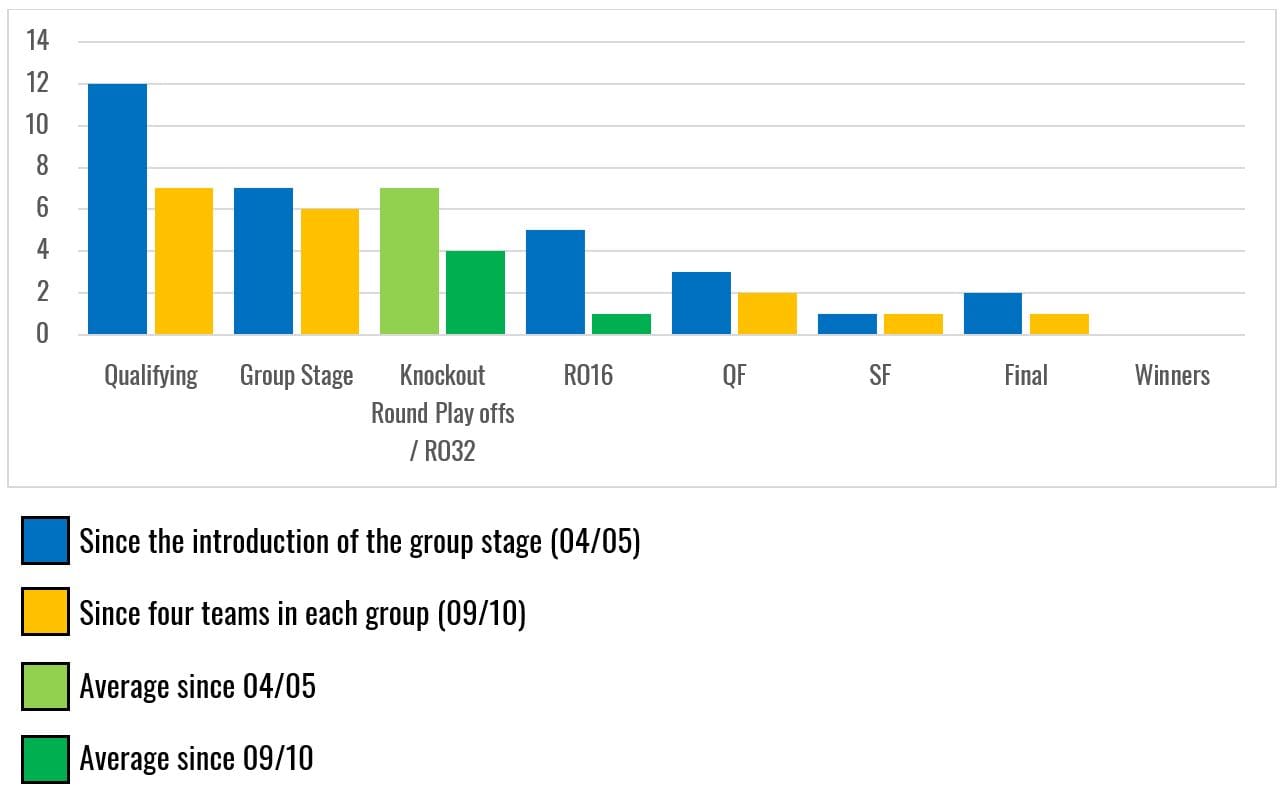
As you can see no team outside the ‘Big Six’ have ever won the Europa League. These statistics give a clear indication of the immense difficulty to win a European competition. The graph above shows that the majority of teams (32%) get knocked out before the group stage, never getting a chance for the big prize money.
The next major comparison is the number of teams who get knocked out in the group stage of the Europa League since the change to four teams per group in the 2009/10 season. This has had a huge effect and is most likely due to the reduction to two play-off spots to enter the knockout stage of the competition. This makes every game count with less chance to progress in the competition. Furthermore, with the decreased number of spots, the number of games each team must play was increased to six, further increasing the demand for teams who will also be competing in the Premier League. This just highlights the enormous stress European football can incur on a team forcing the squad to be rotated drastically as games are played every Thursday in European competitions.
Looking at statistics for the average Europa League journey, a team from outside the ‘Big Six’ will usually reach the round of 32 or the round of 16. Teams average 9 games in the tournament going back to the start of the 2009/10 season which, when looking at the average, can affect 10 weekend matches equalling 25% or a quarter of the Premier League matches a team plays in a season.
Financial
When looking at the effect of European football on teams outside of the ‘Big Six’, the first thing that everyone will think of is the financial benefits of the competitions. This is from the prize money for reaching stages of the competition, the broadcasting money from the current rights holders in BT Sport and the income from matchday within the competition, with increased ticket pricing for the matches along with a chance for more matchdays. Ticket money is difficult to calculate with teams having different stadium sizes, different ticket prices and different matchday income. So to look at the financial benefits of European football we will start by looking at the prize money for reaching each stage of the Europa League as the majority of teams outside the ‘Big Six’ only reach this tournament with the Europa Conference League being too new to predict its effect.
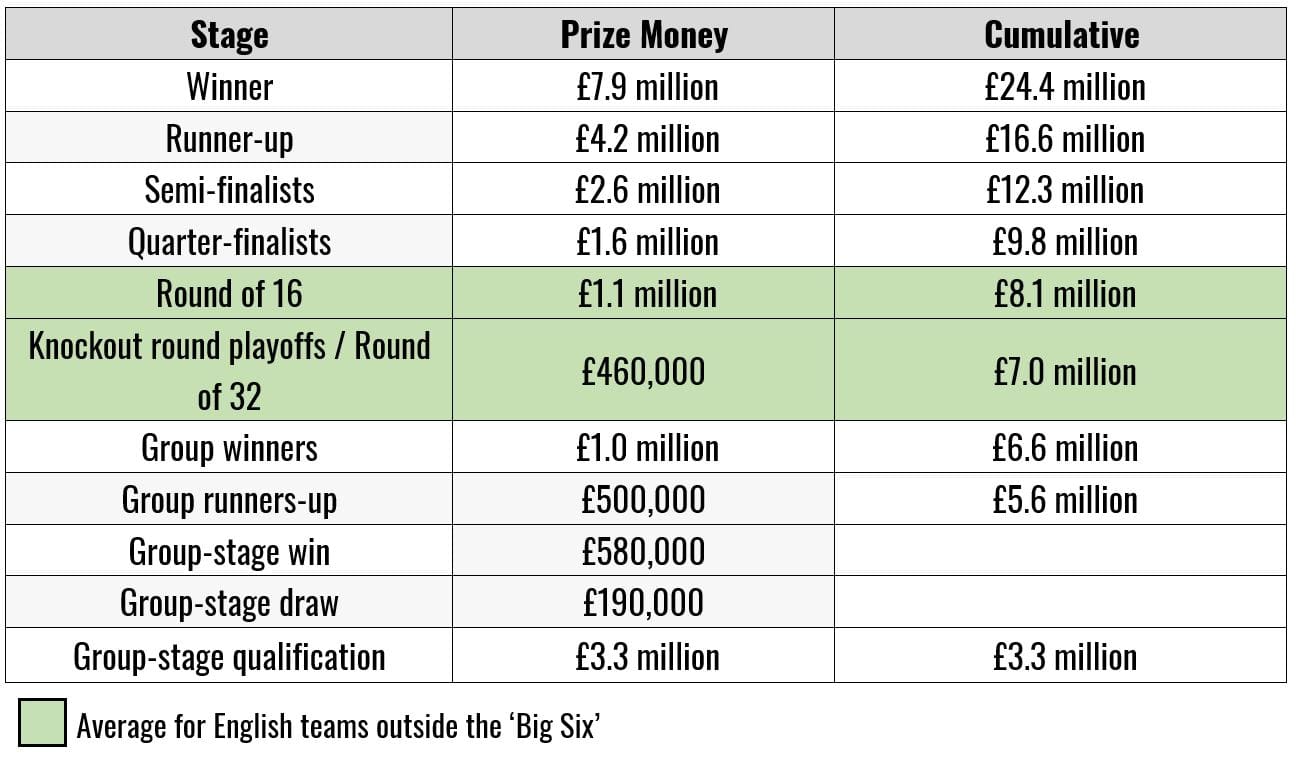
Using this table in conjunction with the average distance a team goes in the competition (seen in green), the average English team away from the ‘Big Six’ will get a total revenue of £7 million to £8 million ($9 – $10 million) from the Europa League. When comparing this to the prize money from the Premier League with teams 5th to 10th receiving £135 million – £145 million in the 2020/21 season, it is considerably smaller. Both of these figures would look different with ticket sales and TV market pool money. In the Europa League teams receive TV marketing money at different rates depending on their UEFA coefficient ranking (UEFA Ranking of domestic clubs). Using an estimated value for the TV money from the Europa League, the average sum of money for a team reaching the round of 32 or round of 16 is around £10 million, this takes the total income from reaching the average stage to £20 million. In the football market today this is not a huge amount of money, with it only covering the cost of half the annual wages of a squad or a cheap transfer.
The largest issue for teams in the Europa League or European football is the midweek matches, which in the Europa League and Europa Conference League are on a Thursday night. This provides little time for a turnaround, especially if the squad have travelled to an away match across Europe. With the congested schedule, teams will have to decide which competitions to pursue and which they can put out a rotated squad for. Looking at the chance of silverware and the financial gains within the four major competitions (Europa League, FA Cup, Premier League and EFL Cup) will provide an insight into what each tournament can provide.

The Europa League has a large prize money pool compared to the other English cup competitions, however, it has the smallest chance of winning silverware in a cup competition. This is a small data set, which makes predicting events very difficult. But this will give the clearest information to show that some tournament teams have a greater chance of winning silverware and progressing, whereas in others the financial reward is the main prize. Teams must prioritise their focus depending on the club’s aims and ambitions to maximise their squad strength for their main competitions.
Investment
Even with the number of money teams receive from competitions, the difficulty of midweek matches is not easy to cope with. It involves lots of rotations within their squads and huge investment to strengthen squad depth and to continue to improve the club in other aspects. The most important factor in a team’s chance at regularly competing for the European places is the correct investment into the club to strengthen all areas ensuring the team doesn’t drop out of European football after reaching it.
Correctly investing in the squad and club is where teams inside the elite of the Premier League have set themselves apart from the rest of English football. This is what enables them to consistently qualify and excel in European football. Many of these clubs have deep squads with some of the world’s top talents and are successfully using European football to sustain the wages and transfer of players. Without strengthening the squad for the Europa League teams may become stretched and fatigued impacting their Premier League matches and form.
A great example of the effect squad rotations may have on a team is Leicester City and West Ham this season. Both teams were competing in the latter stages of European competitions this season, which meant they rested key players for Premier League matches which negatively impacted their form at the business end of the season. With both teams losing in the semi-finals they must now look to secure the Europa Conference League spot to stay in European football.
Historically teams have been affected by European football in different ways. When looking at the effect on teams outside the ‘Big six’ since the 2010-11 season, a total of 13 have qualified for European football, with only three replicating this success the following season and getting consecutive years of European football.
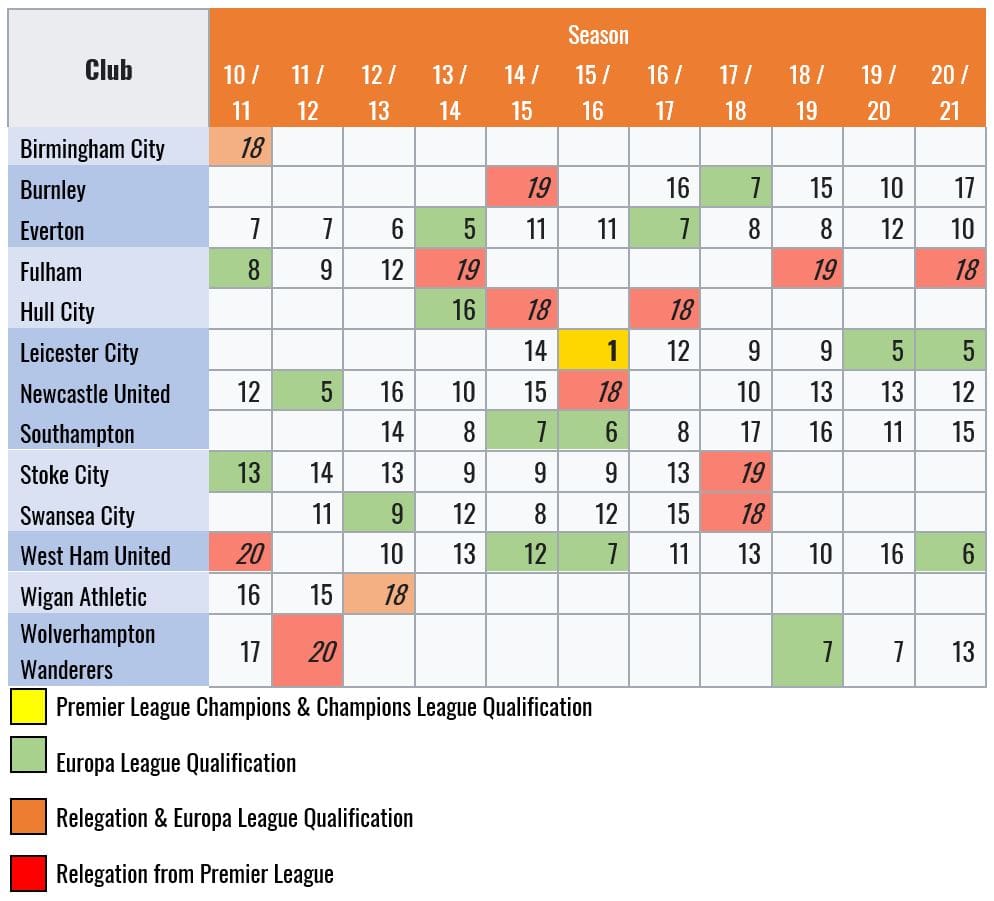
The numbers also show that seven of the teams who have qualified for European football have been relegated in the same or subsequent season. This equates to 53% of teams outside of the ‘Big Six’ that reach European football dropping out of the English top-flight up to seven years later.
A large struggle for teams outside of the ‘Big Six’ is the difficulty to keep their best players. The situations usually follow the same trends as Leicester City’s title-winning season. Leicester had huge success with a squad that started with unknown names in Kante, Vardy, Mahrez, Maguire and many more becoming nationally recognised names. These players surprised the Premier League and instantly become hot targets for the best in Europe, creating a shop window for their best players. With Leicester not having the money or prestige of the top clubs, they were unable to keep their star players (excluding Vardy) at the club. This meant they had to rebuild the squad without their best players from the season before. Although the team would have made an enormous profit from selling players to be put back into rebuilding. The chance of them creating another title-contending or European fighting team the following season was slim, especially with the increased schedule. They ended up finishing 12th that season and only returning to Europe four years after the title-winning season.
This is a very unique example which is unlikely to ever happen again. It does shine a light on the difficulty clubs outside the ‘Big Six’ have to maintain a high standard to push for Europe year on year in the Premier League.
European football is not all negative. Entering these prestigious tournaments can allow teams to set themselves apart from the other teams in the league. Through investing properly in the club teams to keep themselves in and around the European spots challenging for them consistently. Usually, these attempts come in phases with a group of teams breaking away from the mid-pack, as seen from West Ham, Wolves and Leicester City in recent years. This pattern is most likely due to the turnaround of world-class players with teams rebuilding at different times.
Conclusion
With everything that has been said within this analysis, to say no team should aim to enter or challenge for the Europa League or the European competitions is completely wrong. It is the achievement that every team strives for, giving them historical moments for generations, and allowing the team to compete against the best in Europe. Without appropriate investment, teams can plummet out of the Premier League but to be able to challenge the ‘Big Six’ teams must find a way to survive while competing in Europe.
Hopefully, teams are starting the learn from the mistakes of the past and using Europe to take their clubs to new heights. If teams outside the ‘Big Six’ can hold onto their top talents and deepen their squads with quality players, we may have the potential for a team to disrupt the powerhouses of England in the not so distant future.



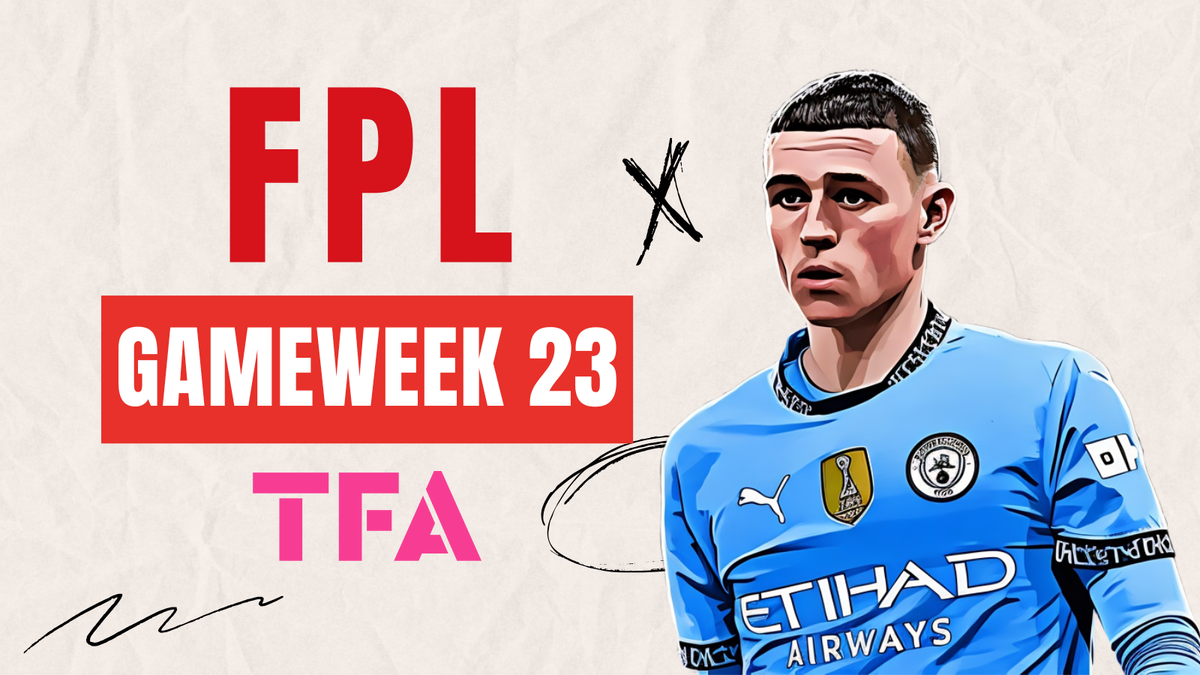
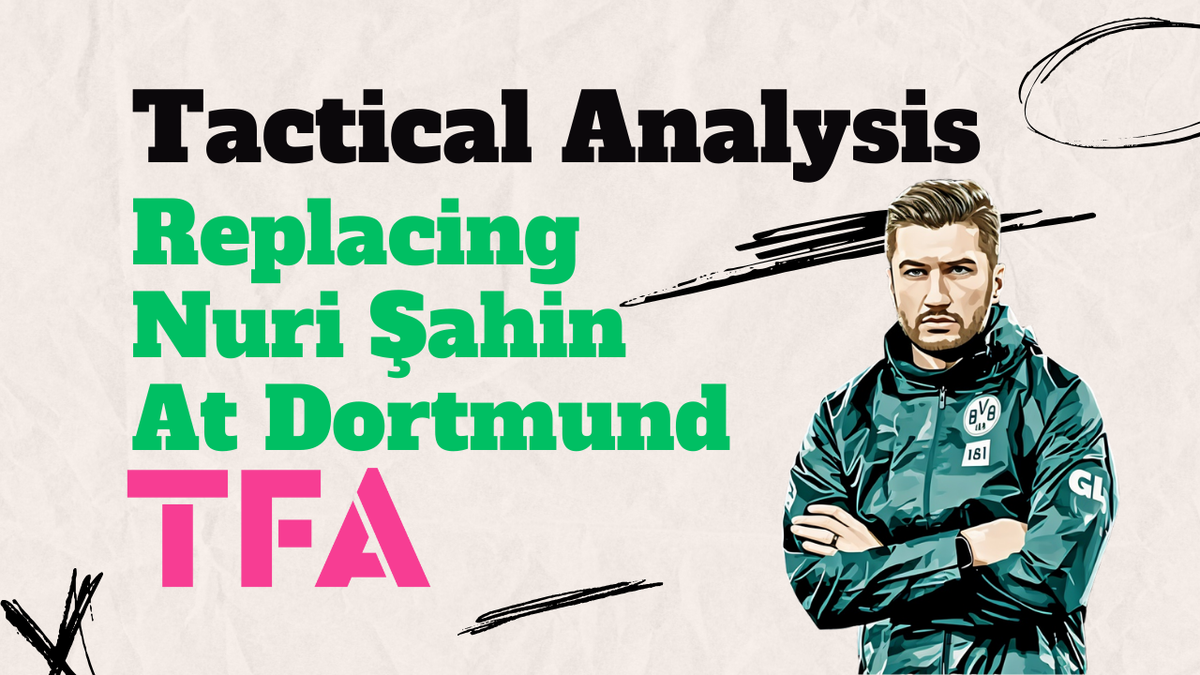
Comments